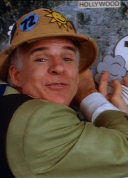Friday, February 8, 1991.
L.A. STORY. Written by Steve Martin. Music by Peter Melnick. Directed by Mick Jackson. Running time: 93 minutes. Rated Mature with the B.C. Classifier's warning: occasional nudity, suggestive scenes and very coarse language.
I'M AFRAID WE'RE going to have to start taking Steve Martin seriously. With Roxanne, his filmed-in-B.C. adaptation of Rostand's Cyrano de Bergerac, he made it clear that he's not just another pretty nose.
Now, as the screenwriter/star of L.A. Story, the wild and crazy guy goes ballistic, practicing irony and reinventing the American movie comedy along the way. From its first frames, the film invokes modern Los Angeles as a state of mind.
Director Mick (Chatttahoochee) Jackson's camera briefly contemplates the rippling waters of a swimming pool before rising up to glimpse a gigantic hot dog floating over the city. The fantastic frank is, of course, suspended beneath a helicopter.
The shot, of course, is borrowed from the opening of Fellini's classic La Dolce Vita. Also suspended between the city and the eternal is Harris K. Telemacher (Martin), the "wacky weatherman" seen daily on the KRQY-14 TV newscast.
Though involved in a "relationship," he is irresistibly drawn to open, unaffected Sara McDowel (Victoria Tennant), an Englishwoman who claims to be "writing an article about Los Angeles for the London Times."
The soulful Telemacher allows himself to be recruited as an interview subject and takes the attractive alien on a "cultural tour of L.A.," a city in which "some of (the) buildings are over 20 years old." Among the must attractions for the tourist is William Shakespeare's grave, followed immediately by a conversation with a very Shakespearean gravedigger (Rick Moranis in an unbilled cameo appearance).
Just what is Martin trying to say? I think he's telling us, via direct quotes and a visual pun, that L.A. is the kind of place the Bard would have dug.
Neither a wild nor crazy notion, it's his way of telling us that the California metropolis has an Elizabethan vigour. It also serves to distinguish Martin's urban comedy style from that of city-proud New Yorker Woody Allen.
Indeed, there's really no point in comparing L.A. Story to Allen's self-absorbed Manhattan meditations. The Martin-Jackson team owe far more to the West Coast comedies of Alan Rudolph.
In a direct line of descent from Rudolph's Welcome to L.A. (1977), Choose Me (1985) and Love at Large (1990), their feature celebrates the glorious, goofy potential of life in a community Martin has called "a retirement village for the young."
Though he allows Sara's estranged husband Roland (Richard E. Grant) to identify L.A. as "a place for the brain dead," Martin clearly finds it endlessly stimulating.
From the Santa Monica Colonic Institute (home of the recreational enema) to L'Idiot, a chic new restaurant that specializes in "the new cruelty," the place is an enchanted island full of voices.
So magical is it that a man might learn the secret of life during a conversation with an electronic freeway sign. Or find a love so powerful that it can raise a tempest.
Seriously.
Steve Martin, a funny and original guy, makes L.A. Story this year's Joe Versus the Volcano. And that, in case you're wondering, is a real recommendation.
The above is a restored version of a Province review by Michael Walsh originally published in 1991. For additional information on this archived material, please visit my FAQ.
Afterword: A fixture on broadcast news calendars since at least 2013, National Weatherman's Day pays tribute to the professional forecasters who devote themselves to sparing us the bother of looking out the window. In real life, my personal favourite is Cambridge physics graduate Steff Gaulter, senior weather presenter for Al Jazeera English. In reel life, the choice is more difficult. Though mostly seen in supporting roles, there are a number of movies starring a guy who actually seems to understands isobars. In director Gore Verbinski's 2005 drama The Weather Man, Nicolas Cage has the title role, playing a depressed Chicago broadcaster whose personal five-day outlook is cloudy. Director Nora Ephron's 2000 comedy, Lucky Numbers, is somewhat sunnier, offering John Travolta as a financially overextended TV weatherman involved in a scheme to rig a state lottery. Neither is as inventive as screenwriter Steve Martin's L.A. Story, the 1991 feature reviewed above. Nor are they as intense as Gus Van Sant's To Die For, the 1995 thriller in which Nicole Kidman stars as a sociopathic weatherwoman whose determination to succeed knows no bounds. That said, my favourite movie weather guy has to be WPBH-TV's Phil Connors. Played to perfection by Bill Murray, he's the one condemned to relive February 2nd over and over and over again in 1993's Groundhog Day.
